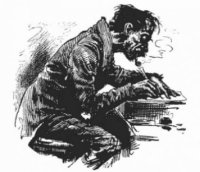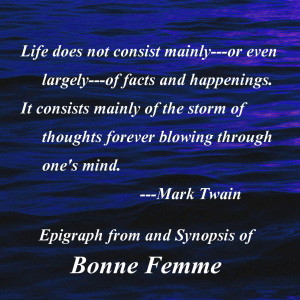A.R. Simmons's Blog: Musings and Mutterings, page 14
March 12, 2014
On the Necessity of Road Trips

Writing is alchemy. We take our experiences (actual and vicarious) and manipulate them into a story to share with others. The story must resonate with our experience, or it never becomes real to us. Reality is the key, whether we set our story in an alien world, a galaxy far away, an imagined past or future, or in the stark here and now. If it’s a sci-fi or fantasy setting, we have a little leeway; no one else has been there either, and so can’t call our hand on it. (We still need to do our research, even for imaginary places.) We cannot Google experience. We must walk the road before leading our reader down it.

In Cold Tears, I set two brief scenes in the artist colony/tourist town of Eureka Springs, Arkansas. Despite having been there several times over the last few years, I wanted to “taste” the place again before setting down the scene in print. My wife and I had a long road trip, driving through the hills of Missouri and Arkansas to get there. We enjoyed a nice meal on the balcony of one of the restaurants on the main street. We walked the town, and took pictures. Later, I drew upon the feelings and the pictures in my mind as I set the scene, not to reproduce my experience, but to portray something believable and authentic.
I like to think of it as a sort of impressionistic portrayal of a real place. That’s what we do, isn’t it? We take our real-life experiences, filter out some elements, embellish others, and try to produce a realistic vicarious experience for the reader. Perhaps the best way I could put it is to tell you about Niagara Falls. I haven't been there, so all I can truthfully say is, that I imagine it’s damp, beautiful, crowded with tourists, and loud. What I can’t do is transport you there because I’ve not “tasted” the place.
We must take the oldest writer's advice that there is: write what you know.
February 9, 2014
Excerpt from "Call Her Sabine"

She gripped her head with both hands to stop the world from spinning and waited for the bloom of pain to subside. The darkness pressed in, and although without visual cues, she sensed that she was in an enclosed space. A muffled whisper broke the deadness a moment before cool air licked at her right cheek and bare shoulders, bringing with it the pungent odor of new carpeting. Pulling up the sheet as a shield, she tried to remember.
A car wreck? Maybe I’ve been in a coma or something.
She shook her head.
A mistake! She gasped at the ferocity of the pain. An involuntary moan painted the silence.
Nothing else hurts. It has to be a concussion. I got dinged—that’s it.
But if this is a hospital, where’s all the noise?
Heedless of the expected pain, she slid her feet from the bed and stood gingerly as the room regained its spin. Nausea flooded through her, but if she heaved, the top of her head would come off. She gritted her teeth and fought it back.
Alcohol poisoning. I acted like a fool again.
Her breathing echoed harshly, amplified by hard surfaces. The sheet slid from her shoulders to the carpeted floor. Suddenly, she lost her equilibrium, took a step to the right, caught her balance, and sat heavily back on the bed. Squeezing her eyes shut to fight the ache behind them, she tried to concentrate, to force an explanation from her woozy brain. It wouldn’t come. She clutched at the bedding in frustration and felt something of a different texture than the sheets. She pulled it toward her in curiosity.
Pajamas—thin cotton pajamas! Or scrubs?
Despite the dark and the overwhelming feeling that she was utterly alone, she manipulated the two pieces of cloth until she had them separated, oriented the top properly, and then pulled it over her head. The effort exhausted her. She sat huddled on the edge of the bed, searching for a shred of memory to bring some sense to it.
How did I get here? In the dark, cold and alone, and naked.
Naked?
Not a hospital! No, whatever this is, it’s not a hospital.
Call Her Sabine
Published on February 09, 2014 04:24
•
Tags:
excerpt, internal-dialog, mood
February 1, 2014
The Evolution of the Series (6) "Call Her Sabine"
 Even as I was writing it, events overtook this story. Real-life horror eerily paralleled my plot. The inspiration, however, came from two classical myths (I won’t spoil the plot by telling you which), and an observation: the vast majority of victims are women.
Even as I was writing it, events overtook this story. Real-life horror eerily paralleled my plot. The inspiration, however, came from two classical myths (I won’t spoil the plot by telling you which), and an observation: the vast majority of victims are women.It occurred to me that young women especially are victimized, and I’m not just referring to physical violence. They are victimized by society’s expectations, men’s demands, and their own desires to fit the model of appearance and behavior with which our media constantly bombards us.
From this idea (as oversimplified as it may be) came this: What if a woman was cherished for her potential and forced to realize that potential? What would a strong woman do in such a situation? This was the origin of Charlie Fouts and her plight.
I hope readers will enjoy this story of dogged persistence and courage in the face of unknown terror and menace.
As I settled in to write, I conceptualized the plot in rough outline form. I knew where I wanted to begin and where I wanted to end. The story, however, is the journey, not the destination. I never worry about how to get to the ending I want. My process is to develop characters, and then let them lead me there. I don’t know if that’s how it’s supposed to work, but it’s the way stories unfold for me.
The story is set in the contemporary Ozark community of Blue Creek. Eccentric characters abound in this story, not all of them indigenous. I admit that I had fun as they revealed themselves. The Carter family (not eccentric) is further developed and extended. Mirabelle is becoming a miniature of her mother and a delight to her doting father.
Call Her Sabine
Published on February 01, 2014 06:08
•
Tags:
characters, courage, persistence, plot, series, strong-women, victimization
December 18, 2013
The Evolution of the Series (5): The King Snake

By the time of this fifth novel, I was growing tired of the sexual obsession theme found in three of the previous four novels. While this tale involves a criminal who technically could be termed a "serial killer," but as the FBI Crime Classification Manual points out, there are more motives to multiple homicides than sexual predation (the vast majority of "stranger" or "serial" homicides). I also wanted to explore the problems arising from Richard's PTSD and depression, as well as Jill's continuing struggle to accomodate herself to her husband's vocation.
Richard isn't the only one with psychic wounds. Jill has gone through tremendous peril, not once, but twice. As this story progresses, a new reminder of the fragility of life, and of what Richard calls "the random cast of fate's net." Now, the Carters have a growing child to build their lives around. Mirabelle becomes Richard's second lifeline, while Jill continues gathering an informal and unconventional extended family. She is the rock of the family, its voice of reason and repository of good sense.
A sniper case that is puzzling as far as motive is concerned becomes almost too much for Richard to bear when the killer strikes close to home. Accusations of police involvement in the drug trade stirred up by an unscrupulous local editor flood the area while the snipings continue.
The King Snake
December 17, 2013
About Not Disappointing the Reader
 I recently read a comment on Goodreads in which a reader was upset by an ending because it did not fit the genre formula. I gather it was a romance or relationship story that had the opposite of a happy ending. Okay. I get it. Life does not always produce happily-ever-afters. However, I understand the reader’s disappointment/outrage. In a sense, she was sold a story under false pretenses. She invested considerable time, immersed herself in the story, endured (vicariously) the hopes, fears, disappointments, perils, and uncertainty of the main character. Those of us who really enjoy reading (make that becoming the main character), understand her feeling of betrayal when things did not turn out as expected/deserved.
I recently read a comment on Goodreads in which a reader was upset by an ending because it did not fit the genre formula. I gather it was a romance or relationship story that had the opposite of a happy ending. Okay. I get it. Life does not always produce happily-ever-afters. However, I understand the reader’s disappointment/outrage. In a sense, she was sold a story under false pretenses. She invested considerable time, immersed herself in the story, endured (vicariously) the hopes, fears, disappointments, perils, and uncertainty of the main character. Those of us who really enjoy reading (make that becoming the main character), understand her feeling of betrayal when things did not turn out as expected/deserved.So here’s the question: does the author owe it to the reader to stick to genre formula? Is it betrayal to make the story more life-like by having it all continuing to go to crap instead of rewarding the long-suffering heroine/reader with what she deserves rather than what life is more likely to throw at her?
I think it all depends on the packaging and marketing. If it is wrapped in Romance cover art, it should probably stick to the genre format. If it is advertised in such a way as to lead the reader to believe he/she is buying a happy ending story, it ought to deliver one. (Disclaimer: since I know little of this genre, I’m not sure of the acceptable variations of plot and formula, so I may be missing something.)
Of course, creativity is all about breaking the mold and devising new formulae. Thoughts?
December 6, 2013
Secret Song

The past is more than prologue for some. It is their totality. It is achingly real and impossible to return to or to forget. Twenty-three years ago Marie disappeared and Harold was sent to prison. Today they both return to Blue Creek.


Published on December 06, 2013 19:19
ssfiread1asm.jpg
Published on December 06, 2013 19:19
December 5, 2013
How to React to a Negative Review
 First, prepare to be surprised. No one will react to your book exactly as you intend or imagine. The reason for that is that writing (and reading) is attempted communication between alien worlds. Your interpretation of the words you use is not identical to that of your readers because your experience is different. Our unique experience has taught us our meaning for concepts, phrases, and individual words. Our mind is a pattern-identifying thing. It interprets new experience in the context of our unique old experience. For example, if I use “June Cleaver” as a descriptive term for a character, I may admire her as a mother to her children, a counselor to her husband, and the keeper of the hearth. You may pity her for her subordinate role, or be angry at the sexism that relegated her to the role. Alternatively, you may not know who the heck “June Cleaver” is. What I intended to convey may not be at all what I intended, in which case what I wrote did not work for you. Sometimes we fail to connect. That’s life.
First, prepare to be surprised. No one will react to your book exactly as you intend or imagine. The reason for that is that writing (and reading) is attempted communication between alien worlds. Your interpretation of the words you use is not identical to that of your readers because your experience is different. Our unique experience has taught us our meaning for concepts, phrases, and individual words. Our mind is a pattern-identifying thing. It interprets new experience in the context of our unique old experience. For example, if I use “June Cleaver” as a descriptive term for a character, I may admire her as a mother to her children, a counselor to her husband, and the keeper of the hearth. You may pity her for her subordinate role, or be angry at the sexism that relegated her to the role. Alternatively, you may not know who the heck “June Cleaver” is. What I intended to convey may not be at all what I intended, in which case what I wrote did not work for you. Sometimes we fail to connect. That’s life.Second, stay positive. After all, someone took the time and trouble, not only to give you a read, but also to think about your book. It has been my experience that a bad review almost always provokes someone else to write one in refutation. Note: let others defend you. Don’t do it yourself. You will seem petty and unprofessional.
Third, learn something. Even if an unkind review is more negative than you think it deserves, see if you can discern the reason for the criticism. It may be that the reviewer is ignorant, opinionated, and primarily pumping his own ego. However, it could be that your skills need honing, or your book needed another edit, or it had holes in the plot. If you are like me, you never believe that your work is perfect, or even finished to the best of your ability. A true artist sees more and more wrong the longer he is finished with his work.
In conclusion, remember that we began by defining the writing/reading exchange as attempted communication between alien worlds. Sometimes a story just doesn’t work for a particular reader. True, that may be the reader’s fault, not ours. Nevertheless, we have failed to communicate. Look carefully at the places where you and your reviewer failed to connect. Maybe there is something there that you can use to do better next time.
October 22, 2013
The Evolution of the Series (4): Secret Song
 Secret Song (RC #4) was the third of the stories written (just before Cold Tears, RC #2). After writing two novels about psychopaths, I was ready for a “smaller” story, but wasn’t sure how to do that and maintain the tension. After all, Mic Boyd and Bobby Lee Paget were intensely evil. If I tried to write about another serial killer, I knew I would grow stale.
Secret Song (RC #4) was the third of the stories written (just before Cold Tears, RC #2). After writing two novels about psychopaths, I was ready for a “smaller” story, but wasn’t sure how to do that and maintain the tension. After all, Mic Boyd and Bobby Lee Paget were intensely evil. If I tried to write about another serial killer, I knew I would grow stale.As for the series, I knew what I wanted to do. I would develop the character of the Carter’s daughter, Mirabelle, and I would incorporate Raven, Shane, and Doc Hoag into the Carter’s extended family. The relationship with Sheriff Shug Shively, and Richard’s continuing rise in importance as a deputy was well in hand, that is to say, I had conceptualized it. I also intended to introduce a new character, one who would play an increasing role in the stories. I envisioned someone who could be both a sounding board for Richard and someone who could think, say, and do things that Richard couldn’t. So I saw the way forward.
However, back to the problem: how was I to write a "smaller" story, without disappointing the reader who would buy the book expecting to find the same level of peril and tension? I decided to write more of a mystery this time. It also occurred to me that many mystery/detective/police procedurals were too linear in plot development, whereas in real-life investigators spend a great deal of time judging what is part of the crime(s) and what is not. Furthermore, deputies seldom are able to concentrate on one crime to the exclusion of others.
Secret Song involves an old (solved) case. The recent return of an ex-con occurs almost simultaneously with the recovery of the body of his victim. One can only imagine the passions ignited by such a coincidence in a small community.
Writing out a bare outline of the plot, I began to imagine how my regular characters and others within the community would react. I had to continue the overriding theme throughout the series: obsession. This story began small, but didn’t stay that way. At the risk of sounding like a latter-day William Blake, my characters began telling me how they would react and what they would say. They carried me along, and I enjoyed the ride. I hope the reader will also.
The tag line for this story might be: "Unspeakable evil does not require evil
intent."
Secret Song
Published on October 22, 2013 06:23
•
Tags:
evil-intent, mystery, obsession, richard-carter-series, suspense
October 8, 2013
The Quote That Makes the Plot
This quote from Twain allowed me to suspend my own disbelief and write a difficult plot into the first of the Richard Carter novels.


Published on October 08, 2013 06:24
Musings and Mutterings
Posts about my reading, my writing, and thoughts I want to share. Drop in. Hear me out. And set me straight.
- A.R. Simmons's profile
- 59 followers






